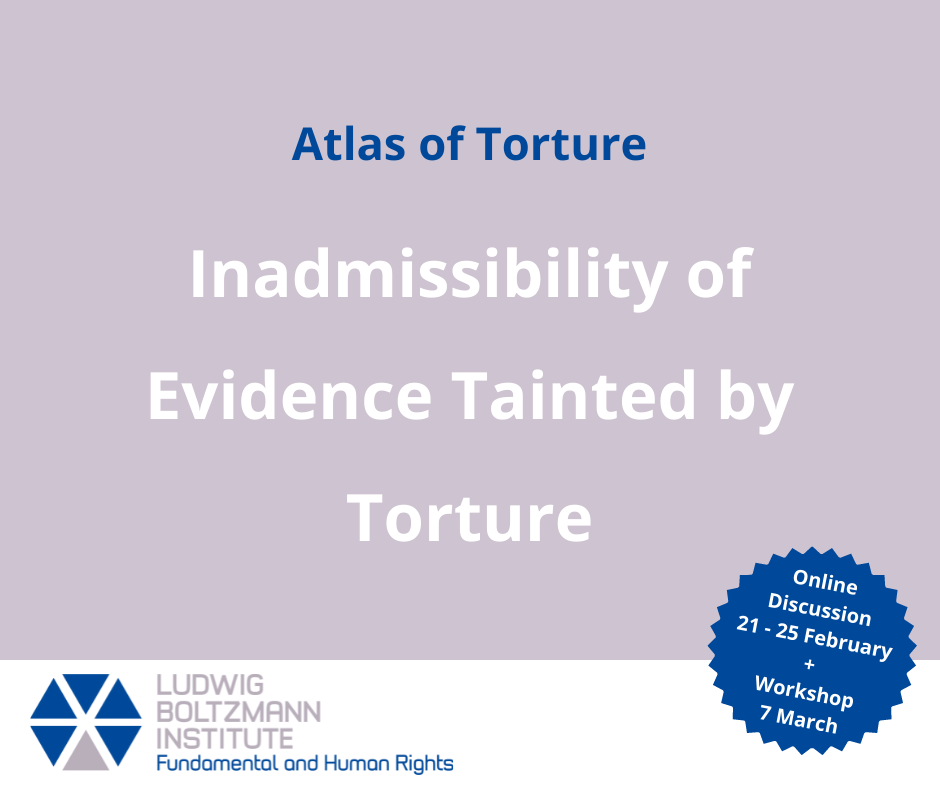Expert online exchange on the inadmissibility of evidence tainted by torture
Background
The use of torture not only amounts to an egregious human rights violation in itself, but also leads to other serious human rights violations, including the violation of the right to a fair trial. The use of torture, and evidence obtained by torture, taints the entire criminal justice process, eroding the rule of law and public trust in the system’s ability to deliver justice. Although the exclusionary rule seems to be firmly established in most legal frameworks, the research conducted so far has highlighted several challenges concerning its application in law and practice.
Without being complete, relevant publications include the ODIHR and Fair Trials publication “Eliminating Incentives for Torture in the OSCE Region”, the Commentary on “The United Nations Convention Against Torture and its Optional Protocol” authored by experts of the Ludwig Boltzmann Institute of Human Rights, the Redress and the Fair Trial and Redress publication “Tainted-by-Torture-Examining-the-Use-of-Evidence-Obtained-by-Torture, as well as the CTI’s practical implementation tool on “Non-admission of evidence obtained by torture and ill-treatment: procedures and practices”.
To encourage exchanges on how recommendations included in these publications could be implemented, OSCE Office for Democratic Institutions and Human Rights (ODIHR) and the Ludwig Boltzmann Institute of Fundamental and Human Rights will facilitate a series of online events among international experts and civil society organizations focused on the exclusionary rule.
The online exchange will thereby foster:
- An exchange on the remaining gaps and common trends in the effective implementation of the exclusionary rule;
- A discussion on what steps are needed to implement the policy and practical recommendations and the role various actors can play in implementing them;
- Sharing of good practices – including examples of where torture-tainted evidence was effectively excluded – and ideas for multi-stakeholder collaboration to ensure the prohibition of torture-tainted evidence is better applied in practice.
Programme
In the week from 21 to 25 February 2022, on our Atlas of Torture – Exchange Platform we have published every day contributions of renowned national and international experts to discuss how to better ensure that evidence obtained by torture is not used in legal proceedings.
The event on the Atlas of Torture will be followed by an Online Workshop, taking place on 13.5.2022, 10:00 – 13:00 CET. The workshop aims to bring together the different experts and further facilitate the exchange on the topic, enabling a lively discussion, as well as mutual learning among the participants. Finally, the online workshop will aim to create a common understanding of existing recommendations and priorities by identifying the most pressing issues concerning the exclusion of torture tainted evidence and how different stakeholders can address them. If you are an expert working on torture prevention and are interested in joining the event, please contact: tvhyvnan.zbavan@havivr.np.ng
The online exchange is part of ODIHR’s ongoing work to assist participating States in the fight against torture. For more information please follow the link: https://bit.ly/3HRTEfN
Contact person: Giuliana Monina, tvhyvnan.zbavan@havivr.np.ng
Persons involved: Giuliana Monina, Nora Katona and Lena Ertle.
